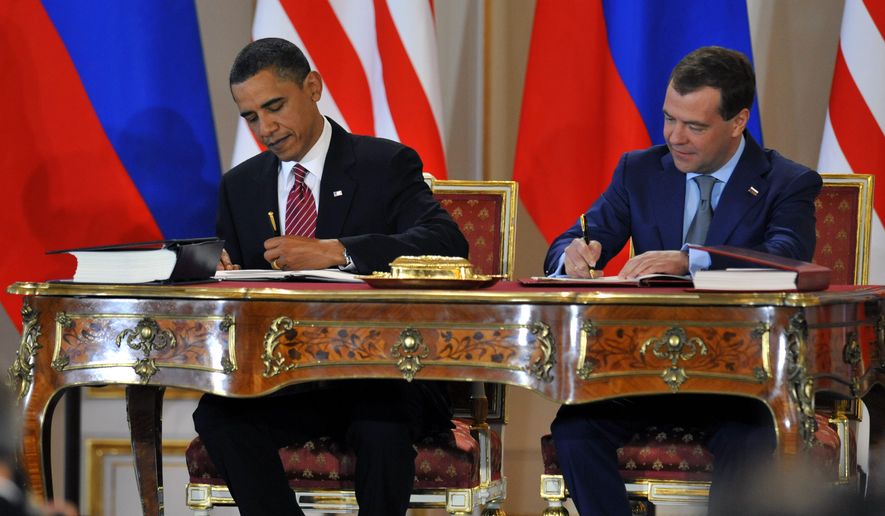The Trump administration should drop plans to extend New START, the landmark nuclear arms treaty with Russia, according to a new analysis from the conservative Heritage Foundation.
The White House has already pulled the United States out of the Intermediate-Range Nuclear Forces (INF) Treaty with Russia dealing with shorter-range “tactical” nuclear weapons, over what the U.S. says is Moscow’s continued non-compliance with the terms of the Cold War-era pact.
Now, with the deadline for extending the New START treaty looming, Washington now has the unique opportunity to recast its relationship with Russia on nuclear arms development into one more favorable to American interests, Heritage Foundation senior analyst Michaela Dodge says.
“For arms control to advance U.S. national security interests and contribute to international stability, the United States must have a willing partner who shares an objective of arms control, namely contributing to international stability,” she wrote an analysis released Tuesday.
Moscow and the United States are the major signatories to the New Strategic Arms Reduction Treaty, widely known as New START, which limits the number of deployable American and Russian nuclear weapons at no more than 1,550.
Initiated in April 2010 under President Obama, the treaty is set now set to expire in 2021. Russian President Vladimir Putin’s government is willing to extend the deal past the 2021 deadline.
Russia stands ready to extend this treaty, to prolong it, but we have to agree on the specifics at first,” Russian Defense Ministry spokesman Igor Konashenkov said last July, when talks over a treaty extension began in earnest between the U.S. and Moscow.
But Ms. Dodge argues that Russia’s behavior has belied the rhetoric from Mr. Putin’s government that Moscow is interested in limiting, and ultimately eliminating, its nuclear stockpile.
“Russia is not a trustworthy partner,” Ms. Dodge wrote in the paper. “Absent a fundamental change in Russia’s aggressive and hostile behavior toward other countries, the extension of New START is contrary to U.S. national security interests,” she added.
Russia’s pledges toward denuclearization, the long-term objective of the New START treaty, is contradicted by the country’s stated defense doctrine toward the development and use of nuclear weapons. Defense Department officials noted that Russian nuclear strategy “mistakenly assesses that the threat of nuclear escalation or actual first use of nuclear weapons would serve to ’de-escalate’ a conflict on terms favorable to Russia,” according to the Pentagon’s Nuclear Posture Review, released last year.
“Russia is backing up its rhetoric with military exercises, practicing the use of so-called low-yield nuclear weapons,” said Ms. Dodge, adding that under Moscow’s current nuclear doctrine, combined with the use of so-called low-yield nuclear weapons, “it control escalation of a nuclear conflict to achieve its objectives without risking a strategic nuclear exchange with the United States.”
Russia’s willingness to threaten launches of less powerful nuclear weapons, as a way to draw foreign policy concessions from the U.S. and the international community, could be given political cover should the New START treaty be extended, Ms. Dodge argues. Some Democrats have watched the Trump administration’s approach to nuclear weapons treaties — including talk of trying to draw China into new, expanded accords — with unease. Under terms of the deal, New START can be extended with an agreement between Mr. Trump and Mr. Putin, while a significant revamp of the deal would require a politically problematic ratification battle in the Senate.
“As long as Russia continues meeting its treaty commitments, there is no logical reason why New START should not be extended,” Sen. Edward Markey, Massachusetts Democrat, said in a recent statement.
• Carlo Muñoz can be reached at cmunoz@washingtontimes.com.




Please read our comment policy before commenting.